Almonds

Varieties available: American Almond, Austrlain Almonds, Irani Mamra Badam, Salted Roasted Badam
Consumers have new reasons to enjoy almonds as researchers have recently announced that nuts not only taste good, but they're also good for you. Almonds are low in saturated fat and contain many other protective nutrients - calcium and magnesium - for strong bones, vitamin E and compounds called phytochemicals, which may help protect against cardiovascular disease and even cancer. Almonds are rich in the vitamins and minerals that help build a healthy heart, especially vitamin E. And these little nutrient nuggets are cholesterol free. Since cholesterol is a major risk factor for heart disease, adding almonds to your diet is a great way to keep that risk under control. Almonds are the perfect combination of iron,copper, phosphorus & Vitamin B1, which helps in fromation of new blood cells & raiuses the hemoglobin levels in the blood.The best method of consumption of this resouceful food for mind & body is simply have a portion of almonds with glass of warm milk in mornings.
Health Benefits of an Almond:
The small sized Almond comes packed with sizeable amount of health benefits. It lowers the risk of gallstones,
weight gain (instead makes you lose weight), high blood pressure, cardiovascular disease and diabetes. It reduces
blood sugar level, weight and LDL (bad)cholestrol, including almonds in your diet keeps heart and blood healthy.
- Almonds help in fighting diabetes and heart diseases: The presence of powerful nutrients like proteins, dietary fibre, mono unsaturated fatty acids (MUFA) and Vitamin E make almond a rich diet source for combating degenerative diseases such as diabetes and heart diseases.
- Almonds are the best source of alpha-tocopherol form of Vitamin-E: Almonds are among the best whole food sources and the best nut source of alphatocepherol form of Vitamin E.
- Almonds are a great cholestrol lowering food: Nearly 70 percent of the fat in almonds is mono saturated, a suggested substitute to saturated fats, to reduce the cholesterol levels. Research also shows that almond and almond oil have similar cholesterol-lowering effects.
- Almonds can aid in cancer prevention: Two flavonoids in almonds (quercetin and kaempferol ) were found to be strong suppressors of lung and prostate tumor growth and these plant chemicals inhibited the tumor cell growth in culture in the studies at Pennsylvania State University. Flavonoids found in almonds also suppressed breast cancer cell growth when these cells have been exposed to cancer-causing agents as
Walnuts

Walnut is oil-rich food, which is a great source of all important omega-3 fatty acids. Walnut is an excellent source of manganese and copper. They also contain very good levels of magnesium and phosphorous. Good levels of zinc, iron, calcium and selenium can also be found in walnut. They also contain traces of iodine. Walnuts are low in sodium. Walnuts contain excellent levels of vitamin B6, thiamin (B1) and pantothenic acid. They also contain very good levels of vitamin E, niacin (b3) and riboflavin (b2).
Health Benefits of Walnut:
Regular consumption of walnuts helps in lowering cholesterol levels, controlling high blood sugars, and improving cardiovascular functions. It is good for various hearth problems. The reason for these benefits of walnuts is that they contain unsaturated fats and little cholesterol, significant amount of omega-3 and antioxidant properties. Walnuts can help prevent gallstones. Though walnut is rich in oil, it low in cholesterol
Health Benefits :
Walnuts are a delicious way to add extra nutrition, flavor and crunch to a meal. They are loaded with vitamins,
minerals, proteins & antioxidants. Regular consumption of walnuts has a soothing effect on our mind & nerves, thus
enabling sound sleep.
- Walnuts are an excellent source of omega-3 essential fatty acids, a special type of protective fat the body cannot manufacture. It has many potential health benefits ranging from cardiovascular protection, to the promotion of better cognitive function and anti-inflammatory benefits
- In addition, walnuts contain an antioxidant compound called ellagic acid that supports the immune system and appears to have several anticancer properties.
- Approximately 15% of the fat found in walnuts is healthy monounsaturated fat. A host of studies have shown that increasing the dietary intake of monounsaturated-dense walnuts has favorable effects on high cholesterol levels and other cardiovascular risk factors.
- Walnuts contain relatively high levels of l-arginine, an essential amino acid, which is converted into nitric oxide, a chemical that helps keep the inner walls of blood vessels smooth and allows blood vessels to relax. Since individuals with hypertension have a harder time maintaining normal nitric oxide levels, which may also relate to other significant health issues such as diabetes and heart problems, walnuts can serve as a great addition to their diets.
Pista

Pistachios are rich in potassium (helps regulate the body's fluid balance), phosphorus (helps build bones and teeth) and magnesium (important element in the conversion of the body's energy), and are also a good source of vitamin B6 (aids protein metabolism and absorption) and thiamine (enhances energy and promotes normal appetite).
These nuts also have a relatively low calorie value when compared to other nuts and are cholesterol free, high in fibre and low in saturated fat. These nuts are also a very good source of protein.
Like most other nuts, pistachios can also cut heart disease risk. The high monounsaturated fat content may actually lower cholesterol levels in the blood. Pistachios also contain antioxidants in the form of phytochemicals. These plant nutrients have been associated with a decreased risk for developing chronic diseases, like cancer.
Pistachios are rich in potassium, phosphorus, magnesium, vitamin B6 & thiamine. These nuts have relatively lower calorie value compared to other nuts. They are cholesterol-free, high in fiber & low in saturated fats. Pistachios have a high content of monounsaturated fat content; this actually lowers cholesterol levels. They also contain phytochemicals that act as antioxidants. Pistachios are best stored in airtight containers.
- Pistachios are rich in monounsaturated fats that can play a role in lowering coronary heart disease risk by decreasing both total cholesterol and LDL cholesterol levels.
- Pistachios are rich in the nutrients like arginine that are thought to reduce hardening of the arteries. Arginine is beneficial because it helps make nitric oxide in the blood, and nitric oxide can prevent build-up along the arterial walls.
- Pistachios also contain phytosterols that may have anti-cancer properties.
- Minerals such as potassium, magnesium, and calcium, found in pistachios are important in maintaining normal blood pressure.
- Participants in the Penn State pistachio study showed no changes in blood pressure, body mass index or weight gain, further supporting previous studies that have also demonstrated no weight gain from the addition of pistachios to the daily diet.
- A 1-oz serving of pistachios, with 49 kernels and 160 calories, offers an excellent source of vitamin B6, copper and magnesium; and are a good source of fiber, thiamin and phosphorus making them a wise snack choice.
Cashewnuts

It is having a balanced nutritive profile. The nutritive values present in Cashew Kernels are Protein, fats, Carbohydrates & vitamins. It is a source of minerals like Calcium, Magnesium, Phosphorous, Potassium, Sodium, Iron and other minerals, which helps prevent anaemic and nervous ailments. So, with the right knowledge it is easy to figure out that the Cashew Kernel does wonders to the human constitution. 0% Cholesterol( Cashew has 0% cholesterol. ) To enjoy its benefit at its best, store cashews in airtight containers.
Health Benefits of Cashew:
Like other nuts Cashew too has an obesity and gallstones fighting property. Presence of high amount of Magnesium ensures healthy bones and teeth structure, while copper produces energy and increases capability of antioxidant defenses. Effects in a healthy heart and bloodstream. Thus, the risk of heart related disease, diabetes and obesity is greatly reduced. Iron controls red-blood cell function and enzyme activity.
- Cashew helps maintain healthy gums and teeth.
- Cashew is an energizing food.
- Cashew contains healthy monounsaturated fat that promotes good cardiovascular health, because monounsaturated fats reduce high triglyceride levels which are associated with increased risk for heart disease.
- Cashew is rich in antioxidants that help in the elimination of free radicals that may cause some cancer.
- Cashew nuts have a high energy density and high amount of dietary fiber, both have been attributed to a beneficial effect on weight management, but only when eaten in moderation
- Cashew’s high copper content is vital in energy production, greater flexibility in blood vessels, bones and joints.
- Cashew nut consumption helps the body utilize iron, eliminate free radicals, develop bone and connective tissue, and produce the skin and hair pigment melanin.
Figs

Figs are high in natural and simple sugars, minerals and fibre. They contain good levels of potassium, calcium, magnesium, iron, copper and manganese. They are one of the highest plant sources of calcium and fiber. Dried figs are richest in fiber, copper, manganese, magnesium, potassium, calcium, and vitamin K, relative to human needs. Figs have a laxative effect and contain many antioxidants. They are a good source of flavonoids and polyphenols. It's suggested that the figs be washed before consumption, soaking them eases the digestion too. The color and texture of figs vary.
Health Benefits
Figs provide renewed vigor & strength to the body especially after prolonged illness or physical & mental exertion. Figs are an excellent tonic for weak people who suffer from cracks in lips, tongue & mouth. Specific health benefits are listed hereunder.
- Figs lower and control high blood pressure because these are packed with potassium, a mineral that can control hypertension.
- Figs also help people lose weight. Figs with their high fiber content can help in weight management.
- Figs are also great for post-menopausal women and for those who have breast cancer. Research has shown that women, who consume fiber-rich fruits regularly, reduce their chances of getting cancer.
- Figs are good for those with diabetes. In some cultures, the leaves of the fig tree are used for its anti diabetic properties.
- Figs increase bone density. Figs are rich in calcium, a mineral that promotes bone density. The potassium in the fruit also counteracts the loss of urinary calcium, thus, preventing bones from thinning out.
- Figs are good for cardiac health. The leaves of the fig tree are said to lower the level of triglycerides, which are a form of fat that are found in the blood stream.
- Figs are also rich in insoluble and soluble fibers that improve the health of the digestive tract: it prevents constipation.
- Figs are rich in benzaldehyde, an anti-cancer compound, beta-carotene, potassium and iron. These also have flavonoids and ficin, a digestive enzyme
The health benefits of figs include promoting healthy bowel function due to the high levels of fibre. Figs are amongst the most highly alkaline foods, making them useful in balancing the pH of the body. They are a good source of potassium, important in helping to regulate blood pressure.
PRUNES
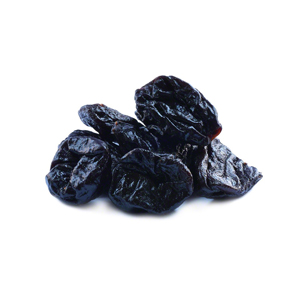
Prunes' soluble fiber helps normalize blood sugar levels by slowing the rate at which food leaves the stomach and by delaying the absorption of glucose (the form in which sugar is transported in the blood) following a meal. Soluble fiber also increases insulin sensitivity and can therefore play a helpful role in the prevention and treatment of type 2 diabetes. And, prunes' soluble fiber promotes a sense of satisfied fullness after a meal by slowing the rate at which food leaves the stomach, so prunes can also help prevent overeating and weight gain.
All prunes are plums, but not every plum is choicest to be a prune. They are good source of potassium the mineral for maintaining normal blood pressure, heart function & reduced risks of a stroke. It also promotes bone health & slows down muscular degeneration. Prunes also aid in normalizing blood sugar levels, provide intestinal protection & lower cholesterol. Remember to keep prunes fresh by storing them in airtight containers in a cool, dry & dark place.
Health Benefits of Prunes
Prunes' Fiber for Regularity, Lower Cholesterol, & Intestinal Protection
Prunes are well known for their ability to prevent constipation. In addition to providing bulk and decreasing the transit time of fecal matter, thus decreasing the risk of colon cancer and hemorrhoids, prunes' insoluble fiber also provides food for the "friendly" bacteria in the large intestine. When these helpful bacteria ferment prunes' insoluble fiber, they produce a short-chain fatty acid called butyric acid, which serves as the primary fuel for the cells of the large intestine and helps maintain a healthy colon. These helpful bacteria also create two other short-chain fatty acids, propionic and acetic acid, which are used as fuel by the cells of the liver and muscles.
Health Benefits
Prunes are absolutely bursting with nutrients and goodness.
- Prunes are the richest food source of protective antioxidants providing a massive boost to natural resistance and vitality. Antioxidants may help lower the risk of heart and lung diseases, some cancers, cataract formation and the effects of aging.
- Prunes have vitamin A, important for healthy eyes and skin, vision, growth, reproduction and the immune system.
- They contain potassium, necessary for nerve impulses and muscle contractions.
- Prunes contain magnesium, vital to many basic metabolic functions.
- Prunes also contain copper that helps the body metabolize and use carbohydrates, thus providing it with energy.
- Prunes provide both soluble and insoluble dietary fibre. About 60 per cent of the dietary fibre in Prunes is pectin, a soluble fibre linked to lowering blood cholesterol levels. Soluble fibre helps reduce blood cholesterol levels thereby reducing the risk of heart disease. Insoluble fibre works mainly in the large intestine, acting like a laxative.
- According to research, prunes may also boost skeletal health. Prunes may contribute to the prevention of bone loss in post-menopausal women. The study showed that women who ate 12 prunes daily for three months had significant increases in serum markers of bone formation, and serum BSAP (bone-specific alkaline phosphatase) activity.
Apricots
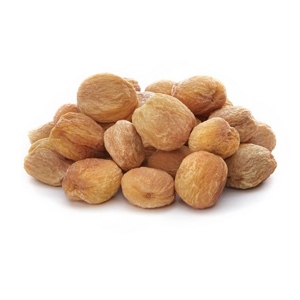
Regarded as a nutritious and a tonic food, apricot is one of the most important fruits which enjoys world-wide popularity. Apricot is somewhat acid in its raw state but its acidity decreases and sugar content increases as it starts ripening. They are an excellent source of beta-carotene which is useful in treating skin related problems and dried apricots are a good source of iron and potassium. Generally used in its dried form, apricots can also be made into excellent jams, jelly and marmalades amongst others. Consuming apricots is a healthy habit as they have a high nutritious value which can help in treating various problems along with aiding in the overall health and well-being of a person.
The apricot is regarded as a nutritious & tonic food which enjoys world- wide popularity. The nut of the apricot is rich in Protein & fat. It contains 40 to 45 percent of oil, which is practically identical to almond oil. Apricots help cure ailments like constipation, indigestion, anemia, fevers & skin diseases. To enjoy their benefits, store them in a cool & dry place.
Health Benefits
Apricots are not only colorful and tasty: they also contain several nutrients that promote good health.
- Apricots are very high in beta-carotene and lycopene, two antioxidant compounds commonly found in orange-red fruits and vegetables that promote heart health and prevent several types of cancers.
- Beta-carotene and lycopene in Apricots also protect LDL cholesterol from oxidation, reducing the risk of developing atherosclerosis and several cardiovascular diseases.
- Apricots are very high in vitamin A equivalents that protect from the degenerative effect of free radicals (oxidative stress) that tend to damage blood supply to the eyes and cause macular degeneration.
- Apricots are also a very good source of fiber, which has several health benefits especially related to the health of the digestive tract: it prevents constipation and cancer-promoting conditions such as diverticulosis.
Health Benefits of Apricots:
Apricot fruit is highly valued as a gentle laxative which is beneficial in the treatment of constipation due to its cellulose and pectin contents. They have an alkaline reaction in the system and thus they aid in digestion if consumed before a meal. Moreover, the fresh juice of apricot leaves is useful in skin diseases as it can effectively treat problems like scabies, eczema, sunburns and other skin related problems. Being rich in Vitamin A, they help in the removal of skin pimples and other skin disorders.
Apricot has high mineral content that makes it beneficial in cases of anemia, tuberculosis and asthma. Due to its high content of iron, it is effectively used in the treatment of anemia. The small but essential amount of copper in the fruit makes iron available to the body and it can also help in increasing the production of hemoglobin in the body thereby helping in the treatment of anemia. Moreover, fresh juice of apricots has been found beneficial in the treatment of fevers also. Having so many health benefits, apricot is a dried fruit which can aid in the overall health and well being of a person.
The kernel is used to extract an oil same as the almond. It is popularly used as a tranquilizer, antispasmodic and eases strained muscles. It also acts as a demulcent or relaxing agent. It is beneficial in the healing of wounds. It works effectively in driving out worms through excretion from the body. It is an effectual general tonic.
Apricots prevent constipation as it is highly appreciated, gentle laxative and is used in the medication of constipation. This ability is due to the presence of cellulose and pectin contents in apricots. The cellulose fibers are not digested and act as roughage to help the bowel movement. The pectin present in it helps in absorption and retention of water. It thus mounts the bulk in faeces and causes easy bowel movement. People suffering from chronic constipation can really be relived by regular use of apricots. Normally six to eight apricots per day are recommended to get the desired relief.
Cranberries

Health Benefits of Cranberries
Apricots are not only colorful and tasty: they also contain several nutrients that promote good health.
Improve the body's circulatory system. A daily glass of cranberry juice will treat diseases like cystitis. Asthma Attack. To overcome an asthma attack, cranberries can be used. Crush the berries, boil it in distilled water and skin. This is effective relief from an attack since the berries contain active ingredients similar to drugs prescribed by your doctors to control asthma. Urinary Tract Infection. As known, the juice has been long known to treat this disease. This is because the juice reduce the number of bacteria adhering to the body's urinary tract lining. A study among elderly patients suggested a 50% reduction of infection among patients who drank 300 ml of cranberry juice everyday for over 6 months. A daily portion of cranberries would also help in treating the disease. Reduces Cholesterol Laboratory results have also shown that cranberry extract reduces the oxidation of "bad cholesterol". This helps promote healthy heart.
Prevent Ulcers New studies have shown the ability of this fruit has the ability to prevent peptic ulcer by inhibiting the adhesion of bacteria to certain parts of the stomach. Anti-Aging An exciting new research has shown that cranberries could help protect the brain from neurological damage.
Pine Nuts
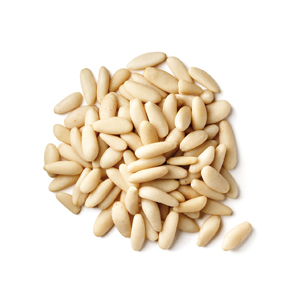
Pine nut is actually a seed produced by a certain variety of pine tree. They are tiny, but do not underestimate its goodness. Pine nuts are an excellent source of iron, manganese, copper, magnesium & high monounsaturated fat, which keeps the cardiovascular system healthy. The oil extracted from pine nuts is precious and useful for health benefits. Chilgozas’ are high-fat nuts and are rich in carbohydrates and proteins.
It's also packed with vitamins A, C & D, which boost the immune system. Pine nuts contain almost three milligrams of iron in one-ounce serving. They are also higher in protein than most nuts & are a good source of thiamine, potassium & phosphorus. Pine nuts are best kept in the refrigerator, in airtight containers.
Health Benefits Listed are a few health benefits of pine cones and the reasons why you should add them to your diet
- Pine nuts can be a potent appetite suppressor as they are a good source of a polyunsaturated fat known as pinolenic acid. When you eat a handful of pine nuts, the pinolenic acid stimulates the secretion of a hormone produced by the intestines known as CCK. CCK sends the signal to your brain that you’re full which turns off your appetite.
- Pine nuts are nutritional powerhouses. A single serving of the pine nut can provide up to fourteen grams of protein per serving, depending upon the species. Pine nuts are anywhere from ten to thirty-four percent protein.
- Pine nuts are also an excellent source of fiber as well as vitamins E, K, and niacin. In terms of minerals, they’re an excellent source of magnesium and potassium which is important for maintaining a healthy heart and blood pressure.
- Pine nuts are high in monounsaturated fats, which have been shown to reduce blood cholesterol levels and also help to protect the arteries from damage which can lead to a heart attack.
- Pine nuts are also high in antioxidants which help to protect the cells of the body from free radical damage.
Raisins
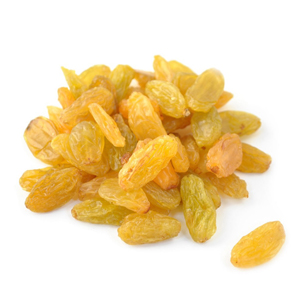
Pine nut is actually a seed produced by a certain variety of pine tree. They are tiny, but do not underestimate its goodness. Pine nuts are an excellent source of iron, manganese, copper, magnesium & high monounsaturated fat, which keeps the cardiovascular system healthy. The oil extracted from pine nuts is precious and useful for health benefits. Chilgozas’ are high-fat nuts and are rich in carbohydrates and proteins.
It's also packed with vitamins A, C & D, which boost the immune system. Pine nuts contain almost three milligrams of iron in one-ounce serving. They are also higher in protein than most nuts & are a good source of thiamine, potassium & phosphorus. Pine nuts are best kept in the refrigerator, in airtight containers.
Health Benefits Raisins are nature's original candy - and one of the world's most nutritious dried fruits.
- Constipation: When ingested, raisins swell as the fiber present in them in dried form absorbs water. This helps giving relief in constipation.
- Weight Gain: Raisins, like all dry fruits, are very good for gaining weight, as they are full of fructose and glucose and give a lot of energy. This is further boosted due to presence of many vitamins, amino acids and minerals which facilitate absorption of other nutrients and proteins in the body.
- Acidosis: Raisins are good source of potassium and magnesium (two of the most popular constituents of antacids, being basic in nature) both of which are very effective in reducing acidity. They neutralize the acids and thus help check acidosis.
- Anemia: Raisins contain considerable amount of iron which directly helps treating anemia. It also contains many members of vitamin-B complex which are essential for the formation of blood. Copper in them also help formation of red blood cells.
- Bone Health: While calcium, which is the main constituent of bones, is present in raisins, it is one of the best sources of Boron, a micro nutrient (a nutrient required by the body in very small amount as compared to other nutrients) which is very necessary for proper bone formation and absorption of calcium
- Eye Care: Raisins contain polyphenolic phytonutrients which have anti oxidant properties which are very good for ocular health, as they protect eyes from damages caused by free radicals (oxidants), such as macular degeneration, age related weakening of vision, cataract etc. In addition, raisins contain very good amount of vitamin-A, beta carotene and carotenoid, all of which are essential for a good ocular health.
- Dental Care: Oleanolic Acid, one of the phytochemicals present in raisins, plays a crucial role in protecting teeth against tooth decay, cavities, brittleness of teeth etc. It effectively prevents growth of Streptococcus Mutans and Porphyromonas Gingivalis, two of the species of bacteria which are most responsible for cavities and other dental problems.
Amla
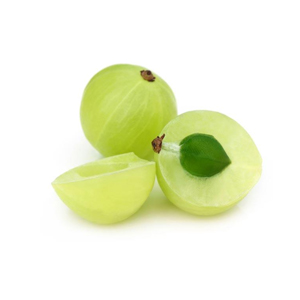
Amla is the most potent natural source of Vitamin C. In fact, this tiny fruit has as much Vitamin C as two oranges. Vitamin C, when taken in the form of supplements, is not always easily absorbed. But when you eat an amla berry, the Vitamin C present is easily assimilated by body. So the next time you think of reaching for a supplement, think again and reach for an amla berry instead.
Health Benefits of Amla
Vitamin C is an excellent anti-oxidant and as amla is so rich in Vitamin C, it has strong anti-oxidant properties and helps combat free radicals. Free radicals are unstable ions in the body, responsible for ageing and cell degeneration. Amla stabilises these free radicals and is believed to be the most powerful rejuvenating agent known to man. Just like most berries, it is low in sugar and has a high fibre content, making it an ideal daily fruit for almost anyone. However, if you have a heart condition, you may want to check with your doctor before taking amla regularly. This is because amla stimulates the heart.
Saffron

Saffron is a spice obtained from the stigmas of the flower of Crocus sativus Linnaeus, commonly known as Rose of Saffron.
A therapeutic plant, saffron is considered as an antispasmodic, which helps in digestion & increases appetite. In the past saffron has been used as a drug to cure infections like flu, depression and as a sedative. Saffron in small quantities is also considered to regulate women's menstruation, and help in conception. It also has a high content of thiamin & riboflavin. Saffron is also believed to reduce melanin content in the epidermis on local application; to simply put it saffron could make a person fairer!
Health Benefits:
Termed as a golden spice, saffron is indeed a very special and a precious spice which has numerous health
benefits.
- Saffron is used for the improvement of digestion and appetite.
- Saffron is found to be extremely beneficial for providing relief from gas and acidity related problems.
- Helps in curing insomnia (a pinch of saffron taken with warm milk in the night helps curing insomnia).
- Saffron is a very popular answer to many skin problems, like dry skin, enhancing and lightening the skin tone etc.
- ? Saffron is used for the treatment of kidney, bladder and liver disorders. It helps in improving circulation to the organs of digestion.
- Saffron helps in treating various disorders like asthma, atherosclerosis, painful menstrual periods and even depression.
- Saffron is considered as a blood purifier and it also has anti-inflammatory properties.
- Massaging the gums with saffron helps in reducing soreness and inflammation of the mouth and the tongue.
- Saffron is an antioxidant and has anti-cancerous properties.
- Saffron being a blood purifier helps in increasing the oxygen content of the blood thereby aiding in the overall health and well being of a person.
Dates

Dates varieties : Ajwa dates, Medjoul Dates, Kalmi dates, Omani dates And many more...
Dates are cholesterol free as well as fat free and are a very important source of energy and food. Dates, when soaked in water and eaten can be useful to build up the heart. Chuara is also used in combination with betel nets in popular supari brands.
Monacca / Raisins
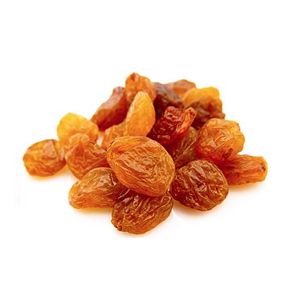
Constipation: When ingested, raisins swell as the fiber present in them in dried form absorbs water. This helps giving relief in constipation.
Weight Gain: Red Raisins / Monacca , like all dry fruits, are very good for gaining weight, as they are full of fructose and glucose and give a lot of energy. Thus, they form an ideal part of the diet for either athletes or body builders who need a lot of energy or those who want to put on weight, without accumulating cholesterol. This is further boosted due to presence of many vitamins, amino acids and minerals (such as selenium, phosphorus etc.) in raisins which facilitate absorption of other nutrients and proteins in the body.
Acidosis: Acidosis is a state of increased acidity of the blood (also known as toxicity of the blood) or of the gases in our respiratory system, the source of acids for both being our stomach. This is very harmful for the body as it may give rise to a number of problems like boils, skin diseases and damage to the internal organs, arthritis, gout, renal calculi, hair loss, heart diseases, tumors and even cancer. Raisins are good source of potassiumand magnesium (two of the most popular constituents of antacids, being basic in nature) both of which are very effective in reducing acidity. They neutralize the acids and thus help check acidosis.
Anemia: Raisins contain considerable amount of iron which directly helps treating anemia. It also contains many members of vitamin-B complex which are essential for formation of blood. Copper in them also help formation of red blood cells.
Fever: Phenolic Phytonutrients, well known for their germicidal, anti biotic and anti oxidant properties, are present in abundance in raisins and help cure fever by fighting viral and bacterial infections.
Sexual Weakness: Raisins are known to stimulate libido and induce arousal, primarily due to presence of an amino acid called Arginine, which is beneficial in treating problems in erection. It has been a common practice in India to make the bride and the groom drink a glass of milk each, boiled with raisins and added with a pinch of saffron. It is also recommended for those suffering from sexual weakness, to consume raisins regularly. This effect is aided with the presence of lot of energy in raisins.
Bone Health: While Calcium, which is the main constituent of bones, is present in raisins, it is one of the best sources of Boron, a micro nutrient (a nutrient required by the body in very small amount as compared to other nutrients) which is very necessary for proper bone formation and absorption of calcium. Boron is particularly helpful in preventing osteoporosis induced by menopause in women and is very beneficial for bones and joints.
Eye Care: Raisins contain polyphenolic phytonutrients which have anti oxidant properties which are very good for ocular health, as they protect eyes from damages caused by free radicals (oxidants), such as macular degeneration, age related weakening of vision, cataract etc. In addition, it contains very good amount of vitamin-A, A-Beta Carotene and A-Carotenoid, all of which are essential for a good ocular health.
Dental Care: Oleanolic Acid, one of the phytochemicals present in raisins, plays crucial role in protecting your teeth against tooth decay, cavities, brittleness of teeth etc. It effectively prevents growth of Streptococcus Mutans and Porphyromonas Catechin, a phenolic anti oxidant present in raisins, is very effective for prevention of tumor and cancer of colon. The fibers in it help excretion of bile from the body, burning of cholesterol and thereby ensuring good cardiac health.
Hazzelnuts
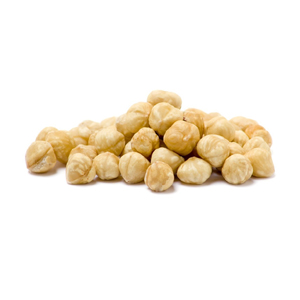
hazelnuts pack a large amount of valuable nutrients. The small snack nut provides multiple health benefits and disease reducing incentives with every serving that you consume.
Nutritional Content
Each one ounce serving size of hazelnuts contains healthy fats, a small amount of saturated fat, moderate protein, and a low amount of carbohydrates with fiber. Hazelnuts also have several vitamins and mineral nutrients that work in metabolic processes, heart disease prevention, bone formation and more.
Vitamin Content
Hazelnuts have adequate amounts of B Vitamins, largely responsible for proper metabolism of fats, carbohydrates and protein. Your body also receives energy through the consumption of the Vitamin B found in the small snack nut. A specific B vitamin found in hazelnuts called thiamin works to help regulate your nervous system and aid healthy muscle and cardiovascular health.
One small serving size of hazelnuts offers a near 20% of your recommended daily consumption of Vitamin E. This valuable vitamin and antioxidant eliminates free radicals within your body that have connections with causing cancer. As an essential nutrient, Vitamin E does not occur naturally in your body, meaning you have to consume the nutrient through food sources hazelnuts.
The Vitamin K in hazelnuts helps regulate blood clotting so that you do not encounter excessive bleeding when injured. The vitamin also works alongside other nutrients to form healthy bones, making hazelnuts a popular choice amongst osteoporosis patients.
Healthy Fats
Hazelnuts have nearly 13 grams of monounsaturated fat per every one ounce serving. Paired with the polyunsaturated fat, these healthy lipids work to reduce bad cholesterol, maintain healthy arteries, and improve overall heart health. Healthy fats have also been linked with lowering overall fat storages, known as triglycerides. This promotes more heart health and overall well being through weight management.
No Cholesterol or Sodium
Protein
Although hazelnuts only contain about 5 grams of protein per each one ounce serving size, they still act as a sufficient secondary source of the valuable macronutrient. Protein works to build healthy and lean muscle within your body, helping improve strength and durability. Try adding hazelnuts to salads or for side dishes to increase your overall protein consumption.
Blueberry

Blue Berries, being very rich in anti oxidants like Anthocyanin, vitamin C, B complex, vitamin E, vitamin A, copper (a very effective immune builder and anti-bacterial), selenium, zinc, iron (promotes immunity by raising haemoglobin and oxygen concentration in blood) etc. boost up your immune system and prevent infections. Once your immunity is strong, you won’t catch colds, fever, pox and all such nasty viral and bacterial communicable diseases.
blueberries may help reduce belly fat and risk factors for cardiovascular disease and metabolic syndrome
While roughage (fiber) in Blue Berries keep away constipation (Of course, a single piece alone will not do. You need to eat a big handful of them), the vitamins, sodium, copper, fructose and acids improve digestion.
Brazil Nut

Brazil nuts have a high proportion of monounsaturated fat, which is a good fat, but they also contain some protein as well as being a good source of important nutrients including magnesium, zinc, calcium, vitamin E and some B vitamins.
Brazil nuts are most renowned, though, for their high selenium content, and are in fact the richest known food source of this important nutrient. Selenium is an essential mineral and antioxidant that is needed daily for a healthy immune system and it helps to prevent damage to our nerves and cells. In fact, just five-six Brazil nuts a day will provide your recommended daily allowance of selenium.
Nuts, including Brazil nuts, contain an antioxidant known as ellagic acid and a recent study by Neurochemical Research found that ellagic acid has an anti-inflammatory effect that could provide neuroprotective benefits, Selenium is a key nutrient needed to help the thyroid function well and consuming Brazil nuts could improve thyroid hormone levels
Macadamia

Macadamia Nuts health benefits includes preventing heart related diseases, lowering cholesterol level, improving brain and nervous system, preventing Alzheimer’s disease, inhibiting inflammation and arthritis, improving vision, strengthening bones, preventing atherosclerosis, support gut health, controls kidney disease, prevent cancers, helps maintain low blood pressure, prevents celiac disease and helps prevent diabetes.
- Prevents Heart Related Diseases
- Lowers Cholesterol
- Prevent Alzheimer’s Disease
- Inhibits Inflammation and Arthritis
- Improves Vision
- Strengthens Bones
- Helps Control Kidney Disease
- Prevents Anemia
- Prevents Cancer
- Maintain Low Blood Pressure
- Prevents Diabetes
Pecan

According to a study in the Journal of Agricultural and Food Chemistry, pecans (19 halves, 193 calories per serving) contain more antioxidants than any other tree nut. Pecan nuts in fact rank among the top 15 foods with the highest levels of antioxidants according to the USDA. They are also a powerhouse of vitamins and minerals such as manganese, potassium, calcium, iron, magnesium, zinc, and selenium, offering some wonderful health benefits.
Health Benefits of an Pecan:
- Heart Healthy
- Improves Digestion
- Helps with Weight Loss
- Reduces the Risk of Certain Cancer
- Boosts Immunity
- Prevents Skin Problems
- Anti-aging Benefits
- Prevents Hair Loss
- Stimulates Hair Growth
Black currents

Our dried black currants are dried naturally without any added sugars or oils. They are 100% pure fruit and all natural with no additives. Black currants have the highest Vitamin C content of any berries. A few tablespoons of dried black currants are over 100% the recommended daily value. Black currants are an extremely popular berry throughout Europe where they are renowned for their delicious tangy flavour.
Health Benefits of an Black currents:
- Black currants are known for their high content of vitamin C, GLA (Gamma-Linoleic Acid) and potassium. They contain twice the amount of potassium found in bananas, 4 times the vitamin C in oranges and twice the antioxidants in blueberries.
- Black Currants contain anthocyanins that help in fighting against cardiovascular disease, aging, joint inflammation, eyestrain, urinary infections, kidney stones and even cancer.
